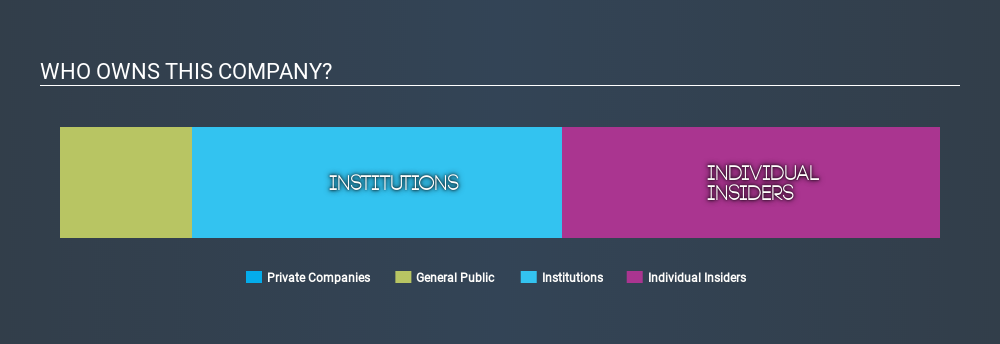- United Kingdom
- /
- Capital Markets
- /
- AIM:MAC
What Kind Of Shareholder Appears On The Marechale Capital Plc's (LON:MAC) Shareholder Register?

The big shareholder groups in Marechale Capital Plc (LON:MAC) have power over the company. Institutions will often hold stock in bigger companies, and we expect to see insiders owning a noticeable percentage of the smaller ones. I quite like to see at least a little bit of insider ownership. As Charlie Munger said 'Show me the incentive and I will show you the outcome.
Marechale Capital is not a large company by global standards. It has a market capitalization of UK£517k, which means it wouldn't have the attention of many institutional investors. In the chart below, we can see that institutions are noticeable on the share registry. We can zoom in on the different ownership groups, to learn more about Marechale Capital.
Check out our latest analysis for Marechale Capital

What Does The Institutional Ownership Tell Us About Marechale Capital?
Many institutions measure their performance against an index that approximates the local market. So they usually pay more attention to companies that are included in major indices.
As you can see, institutional investors own 42% of Marechale Capital. This implies the analysts working for those institutions have looked at the stock and they like it. But just like anyone else, they could be wrong. When multiple institutions own a stock, there's always a risk that they are in a 'crowded trade'. When such a trade goes wrong, multiple parties may compete to sell stock fast. This risk is higher in a company without a history of growth. You can see Marechale Capital's historic earnings and revenue, below, but keep in mind there's always more to the story.

Marechale Capital is not owned by hedge funds. Our data suggests that Mark W. Warde-Norbury, who is also the company's Top Key Executive, holds the most number of shares at 20%. When an insider holds a sizeable amount of a company's stock, investors consider it as a positive sign because it suggests that insiders are willing to have their wealth tied up in the future of the company. The second largest shareholder with 14%, is Patrick Booth-Clibborn, followed by Capital Accumulation Limited, Asset Management Arm, with an ownership of 6.3%. Interestingly, Patrick Booth-Clibborn is also a Chief Executive Officer, again, pointing towards strong insider ownership amongst the company's top shareholders.
On further inspection, we found that 52% of the share register is owned by the top 6 shareholders, suggesting that the interests of the larger shareholders are balanced out to an extent by the smaller ones.
While it makes sense to study institutional ownership data for a company, it also makes sense to study analyst sentiments to know which way the wind is blowing. We're not picking up on any analyst coverage of the stock at the moment, so the company is unlikely to be widely held.
Insider Ownership Of Marechale Capital
The definition of company insiders can be subjective, and does vary between jurisdictions. Our data reflects individual insiders, capturing board members at the very least. The company management answer to the board; and the latter should represent the interests of shareholders. Notably, sometimes top-level managers are on the board, themselves.
Most consider insider ownership a positive because it can indicate the board is well aligned with other shareholders. However, on some occasions too much power is concentrated within this group.
Our most recent data indicates that insiders own a reasonable proportion of Marechale Capital Plc. It has a market capitalization of just UK£517k, and insiders have UK£221k worth of shares in their own names. It is great to see insiders so invested in the business. It might be worth checking if those insiders have been buying recently.
General Public Ownership
The general public holds a 15% stake in MAC. While this group can't necessarily call the shots, it can certainly have a real influence on how the company is run.
Next Steps:
I find it very interesting to look at who exactly owns a company. But to truly gain insight, we need to consider other information, too. To that end, you should be aware of the 4 warning signs we've spotted with Marechale Capital .
Of course, you might find a fantastic investment by looking elsewhere. So take a peek at this free list of interesting companies.
NB: Figures in this article are calculated using data from the last twelve months, which refer to the 12-month period ending on the last date of the month the financial statement is dated. This may not be consistent with full year annual report figures.
Love or hate this article? Concerned about the content? Get in touch with us directly. Alternatively, email editorial-team@simplywallst.com.
This article by Simply Wall St is general in nature. It does not constitute a recommendation to buy or sell any stock, and does not take account of your objectives, or your financial situation. We aim to bring you long-term focused analysis driven by fundamental data. Note that our analysis may not factor in the latest price-sensitive company announcements or qualitative material. Simply Wall St has no position in any stocks mentioned. Thank you for reading.
About AIM:MAC
Marechale Capital
Provides professional advisory and broking services to companies in the United Kingdom.
Mediocre balance sheet low.
Market Insights
Community Narratives





